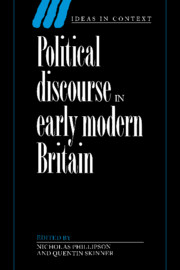Book contents
- Frontmatter
- Contents
- Contributors
- Preface
- PART I
- PART II
- PART III
- PART IV
- 13 Shaftesbury, politeness and the politics of religion
- 14 Propriety, property and prudence: David Hume and the defence of the Revolution
- 15 The rhapsody of public debt: David Hume and voluntary state bankruptcy
- 16 Universal monarchy and the liberties of Europe: David Hume's critique of an English Whig doctrine
- PART V
- A bibliography of the writings of J. G. A. POCOCK
- Index
- Ideas in Context
14 - Propriety, property and prudence: David Hume and the defence of the Revolution
Published online by Cambridge University Press: 07 May 2010
- Frontmatter
- Contents
- Contributors
- Preface
- PART I
- PART II
- PART III
- PART IV
- 13 Shaftesbury, politeness and the politics of religion
- 14 Propriety, property and prudence: David Hume and the defence of the Revolution
- 15 The rhapsody of public debt: David Hume and voluntary state bankruptcy
- 16 Universal monarchy and the liberties of Europe: David Hume's critique of an English Whig doctrine
- PART V
- A bibliography of the writings of J. G. A. POCOCK
- Index
- Ideas in Context
Summary
The publication of the History of England finally established Hume's reputation as a Tory. The Whiggery of George III's reign could probably have survived the effects of his attack on reason, which had destroyed the epistemological foundations on which its theories of natural rights and contract depended. But, in what Hume called ‘the historical age’, it was much less easy to ignore an assault on Whig historiography which was not only intellectually devastating but was set out in a work which was becoming a bestseller at home and abroad. The History of England had destroyed the credibility of traditional claims that England was a country which possessed an ancient constitution whose principles had been periodically reaffirmed and perfected in the course of a long and continuous history. So far as the history of the modern age was concerned, Hume had drawn on Harrington and Clarendon to develop a strikingly subtle account of the catastrophes of the Civil War. It had taken place, he argued, in a country which had entered its post-feudal age but had not yet entered the age of commerce. It was the story of a court and parliament engulfed by Arminian superstition and Puritan enthusiasm and a country dominated by a gentry which had been freed from the bondage of feudal tenures but lacked the political understanding needed to secure their property and avoid the quicksands of religious zealotry.
- Type
- Chapter
- Information
- Political Discourse in Early Modern Britain , pp. 302 - 320Publisher: Cambridge University PressPrint publication year: 1993
- 7
- Cited by



